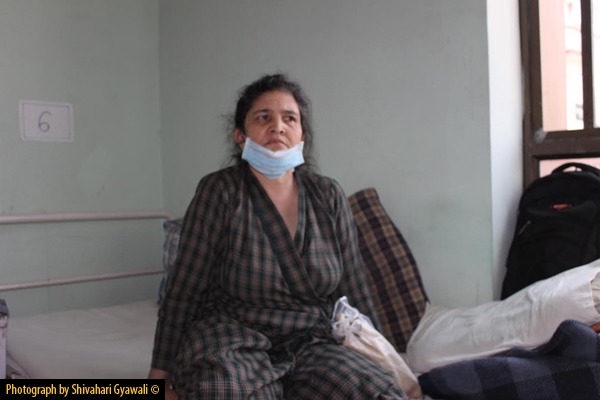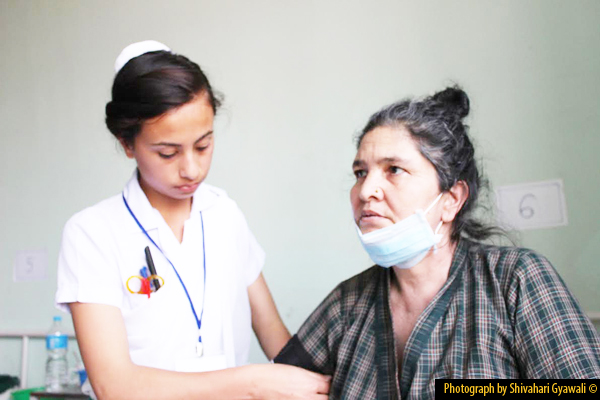Ganga Maya Adhikari, who staged a 360-day hunger strike last year demanding action against the murderers of her son Krishna Prasad, has given a new 10-day ultimatum to the government to address her demands. Since Friday, 5 June 2015, she has only been taking juice and water, heightening her protest against the continuing injustice.
Speaking to a representative of the Asian Human Rights Commission today ( June 9) , Ganga Maya Adhikari said, “It has been long since the government filed the case, but the perpetrators are yet to be punished. My husband died fighting for justice. They killed him and I have no option other than staging a fast-unto death to continue the battle for justice”. Ganga Maya has given a 10-day ultimatum to the government to arrest the accused that are absconding, and to pronounce a verdict in the case, which is sub-judice at the Chitwan District Court.

Following the Great Earthquake of 25 April 2015, she has been staying at the Trauma Center at Bir Hospital. The government has been providing single security personnel for her security, and been paying for all the medical expenses. Ganga Maya has lost contact with her eldest son Nur Prasad Adhikari for a while now.
Ganga Maya and her husband Nanda Prasad of Phujel, Gorkha had staged a fast-unto-death, demanding action against the murderers of their son Krishna Prasad, who was allegedly killed by Maoist cadres at Bakulahar Chowk of Ratnanagar, Chitwan, in June 2004.
The Adhikari couple first began their hunger strike in front of the Prime Minister’s official residence at Baluwatar in January 2013. Dr. Baburam Bhattarai, who won the election from Gorkha, was Prime Minister at that time. The couple was arrested and kept in police custody for over a month. Then, in June 2013, when the Supreme Court Chief Justice Khil Raj Regmi was head of the interim government, the Adhikaris were detained again and taken to a mental hospital in Lagankhel.
They launched their second hunger strike the following month and ended it on the 47th day, after an agreement with the government, which included a promise of action on the First Information Report (FIR). Police arrested some of the accused. But, after Bhattarai and his comrades issued threats, they were released. Let down, the Adhikaris resumed their hunger strike on 24 October 2014. One of those arrested, Parshuram Poudel, was released by the police, citing lack of evidence.

Nanda Prasad Adhikari died on 23 September 2014, after 329 days of fast-unto-death at the Bir Hospital. Even after losing her husband, Ganga Maya continued her hunger strike for a total of 360 days, until the government signed a five-point deal with her in October 2014. She broke her fast, agreeing to a liquid diet. However, she still remains in hospital awaiting justice.
Now, once again, she has raised the stakes. Even when breaking her fast in October last year, she continued to reject all solid foods. Now, she has rejected everything apart from juice and water to demand that the government punish the murderers of her son.
Only after the murderers are punished, she says, will she allow the government to perform the last rites for her deceased husband. Her husband’s corpse remains unclaimed at the Tribhuvan University Teaching Hospital, located at Maharajgunj, Kathmandu, for the past 8 months.
As per the agreement between Ganga Maya and the government, the accused involved in killing her son Krishna Prasad are to be produced in Court, and the judicial process facilitated. The government had also promised to take responsibility for the security of Ganga Maya and her son Nur Prasad Adhikari, agreeing to provide relief and assist with housing and livelihood.
However, the promises made have not been honored. And, now the government might well cite the earthquake and its aftermath as another excuse for the delay. However, in doing so, the government will fool no one. These excuses have been but a testament to the culture of impunity prevailing in Nepal, of which the Adhikari case is a prime example.
The government of Nepal and its justice mechanisms are engulfed in protecting criminals as a matter of routine politics. And, this has infected the lives of common Nepalese, making the entire system that they have to contend with unjust.